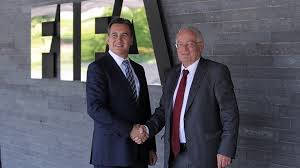By Paul Nicholson
November 13 – The 2018 and 2022 World Cups will be played in Russia and Qatar, as originally voted for by FIFA’s executive committee on December 2, 2010. The inquiry into the FIFA World Cup Bidding process has found no smoking guns, no bags of cash under tables or even in safety deposit boxes, and no evidence of root and branch corruption that would warrant removal of the biggest event in world sport from the current mandated host countries.
What the report did find was that bidding for World Cups is an aggressive, and often dirty, political (and increasingly geo-political) power play that can disaffect individuals and federations, and can stretch FIFA bidding and ethics rules to their limits.
The much-anticipated summary of the report of chief FIFA ethics investigator Michael Garcia’s inquiry – running to 41 pages – by the chairman of the Ajudicatory Chamber of the FIFA Ethics Committee Hans Joachim Eckert, has a recurring message on each of the nine bids.
Where irregularities or breaks of the rules were found, Eckert says they were “…not suited to compromise the integrity of the FIFA World Cup 2018/2022 bidding process as a whole.”
For Russia and Qatar, in particular, there will be a strong sense of vindication and a large amount of relief, even though they both maintained throughout that they trusted the FIFA Ethics process would clear them of any wrongdoing.
Qatar in particular has maintained for the past four years, in the face of extreme media pressure, that it broke no rules. The Qataris could be forgiven if they decided now was the time to celebrate and break their own religious no-alcohol rule.
The findings regarding Qatar are summarised in depth, especially the relationship between Mohamed Bin Hammam – the Qatari former AFC president and FIFA executive committee member – and the Qatar 2022 bid team.
Bin Hammam was been banned for life from football activities by the FIFA Ethics Committee in 2012. In that investigation it had been found that Bin Hammam had made several improper payments to African football officials before the December 2010 vote but that “the record before the Investigatory Chamber of the FIFA Ethics Committee does not support the conclusion that the purpose of these payments was to promote the Qatar 2022 FIFA World Cup bid. Rather, the evidence before the Investigatory Chamber strongly suggests that Mr Bin Hammam paid CAF officials to influence their votes in the June 2011 election for FIFA president where he was a candidate.”
Similarly a payment of $1.2 million that appears to have been made by Bin Hammam to then CONCACAF president and FIFA executive committee member Jack Warner after the December 2010 vote, is judged to have been “in connection to Mr Warner’s decision to resign from FIFA and refuse to cooperate in the proceedings against Mr Bin Hammam.” Clearly that payment breached the FIFA Code of Ethics, “however, that misconduct does not appear related to the December 2, 2010 FIFA World Cup vote.”
The section analysing Qatar is the longest in the summary, perhaps not surprisingly considering the relentless heavy armour that has been fired in the country’s direction. In summary of the summary:
– On the role and relevance of a whistleblower – a revenge motivated former employee who altered evidence to suit allegations;
– on Bin Hammam paying for Reynald Temarii’s legal bills in his appeal against his FIFA suspension – it eliminated a vote for Australia but did not affect the outcome of the vote;
– on sponsoring the CAF Congress in Angola – no bidding rule or code of ethics provision prohibits this kind of sponsorship;
– on the Brazil vs Argentina friendly in Doha, Qatar – arranged by a private entity with no affiliation to Qatar 2022 or the Qatar FA.
The report did raise concerns about the “conduct of two (unnamed) individuals who acted as consultants or advisors to the Qatar 2022 bid team”. Eckert also mentions “potentially problematic conduct of specific individuals in the light of relevant FIFA Ethics rules.” Future proceedings against these unnamed individuals has not been ruled out.
The report on the findings regarding the Russian 2018 bid is considerably shorter than the Qatari report with the allegations against the Russians having been more limited and centred around collusion with other bid committees, compliance with obligations to report contacts made with FIFA executive committee members, and gifts and other benefits that were offered or made.
While the report said that Russia had not made all documents available to review and that certain correspondence had become unavailable (withheld by Google USA, ironically considering Garcia was banned from entering Russia), or destroyed (leased laptops had been returned and wiped of correspondence), the impression is that the allegations lacked substance and in terms of gifts were well within the FIFA guidelines.
Eckert’s summary says: “There was no sufficient evidence that the Russian 2018 bid committee had attempted to unduly influence the 2018/22 World Cup bidding process by contacting FIFA executive committee members.” It continues: “The ethics committee considered the evidence available as not sufficient to support any findings of misconduct by the 2018 bid team or any individual involved with it, to compromise the bid process.”
For the bid committees who complained loudest of corruption immediately following the 2010 vote, most notably Australia and England (and trumpeted by their own national press), there is a stinging rebuke delivered via the investigation of their own bids which were both found to have broken the rules – but, crucially, not to the extent of affecting the outcome or integrity of the vote process.
Both countries were knocked out in the first rounds of their respective ballots for 2018 and 2022. One wonders, having read the reports on their bid, whether there is any truth in the saying “nice guys come last”.
Contact the writer of this story at moc.l1734864616labto1734864616ofdlr1734864616owedi1734864616sni@n1734864616osloh1734864616cin.l1734864616uap1734864616

